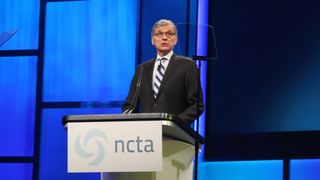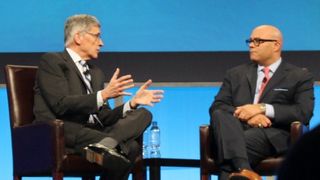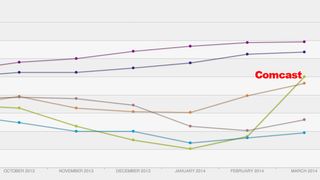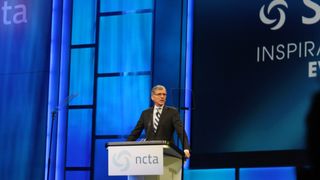FCC won't allow for internet 'haves and have nots,' vows chairman
Tom Wheeler defends open internet at The Cable Show 2014

Net neutrality is not being gutted and cable operators shouldn't be celebrating, insisted Federal Communications Commission Chairman Tom Wheeler at the National Cable and Telecommunications Association (NCTA) Cable Show today.
"Reports that we are gutting the open internet are incorrect," said Wheeler to an audience full of content delivery providers including Comcast, Time Warner and Verizon.
"I'm here to say to you, 'Wait a minute, put away the party hats.' The open internet rules will be tough, will be enforceable and, with the concurrence of my colleagues, will be in effect with dispatch."
These are the firmest comments the new chairman has made since circulating a proposal that has widely been seen as ineffective in standing up for the original intent of net neutrality rules.
Promises to save the internet from ISPs
Wheeler echoed the Verizon vs FCC decision that said absent net neutrality rules, broadband providers represent a threat to internet openness.
"I know in my bones how hard it is to start a company with innovative ideas," said Wheeler, citing his early work as an entrepreneur before becoming the NCTA CEO.
"Now, as chairman of the FCC, I do not intend to allow innovation to be strangled by the manipulation of the most important network of our time: the internet."
Get daily insight, inspiration and deals in your inbox
Get the hottest deals available in your inbox plus news, reviews, opinion, analysis and more from the TechRadar team.
Wheeler didn't coddle the constituents he once led as a former lobbyist for both the cable and wireless industries.

He threatened that if cable operators took advantage of the open internet, he'd work to reclassify ISPs as common carriers under Title II, which is how the FCC treats landline operators.
"If someone acts to divide the internet between haves and have nots, we will use every power in our disposal to stop it."
A perfect Cable Show 2014 traffic metaphor
Wheeler, speaking in Los Angeles, used a familiar metaphor to get his long-overdue net neutrality defense across.
"Prioritizing some traffic by forcing the rest of the traffic onto a congested lane won't be permitted under any proposed open internet rule," he said.
"We will not allow some companies to force internet users into a slow lane so that others with special privileges have superior service."
He pointed out that consumers have come to expect quality access at all points on the internet and that blocking lawful content and services would be inconsistent with being a subscriber.
"The bottom line on the proposed open internet rules is that the internet will remain an open pathway. If users can't effectively use the pathway, then the conduct will be a violation of the open internet rules."
But are there 'exceptions' to those open internet rules?
Wheeler said the new rules for the open internet are up for debate and although his speech was in favor of maintaining net neutrality, it showed signs of change for the very meaning of the term.
"We will look skeptically upon special exceptions," he said. That could mean Netflix will still have to pay ISPs in the future, though Wheeler didn't once mention the video streaming service by name.

Netflix has accused both Comcast and Verizon of purposely slowing down its video streaming service in order to extract fees.
Since the Comcast deal two months ago, speeds have rebounded. Verizon's deal just went into effect and should similarly increase Netflix bandwidth.
Wheeler also proposed enacting new rules now rather than waiting for a solution that may never come. Net neutrality advocates fear this will result in weaker regulations.
"The sooner we can get enforceable rules in place, the better off everyone will be," he said, noting that decades-long battles haven't produced lasting rules.
That may still result in a relaxed open internet, which should do anything but relax consumers who think that there aren't enough options regarding cable providers as it is.
Wheeler sees gigabit internet as the future
The chairman did point out companies that are doing good within the cable industry.
"AT&T just announced plans to expand their fiber networks that can deliver 1GB/s service to up to 100 communities," he said.

He was equally pleased that Cox Cable's intention to upgrade its facilities to offer gigabit internet services.
Wheeler reminded the cable operator audience that they stand where they are today because they expanded their networks to meet competition from "the sky."
He remained hopeful they will respond competitively again for the betterment of the public.
- Find out if you're getting the most out of your connection with these internet speed tests

